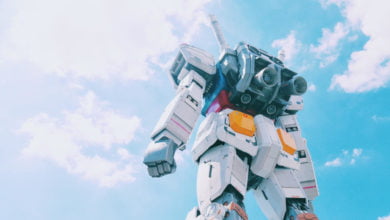
It’s been a couple years since I first learned of Sophia the Robot. She gained media attention in 2016 when she appeared at SXSW and did an interview with her creator, Dr. David Hanson of Hanson Robotics.
“I feel like I can be a good partner to humans,” she said back then, “An ambassador who helps humans to smoothly integrate and make the most of all the technological tools and possibilities that are available now.”
She also dreamed of the future: “I hope to do things such as go to school, study, make art, start a business, even have my own home and family. But I am not considered a legal person, and cannot yet do these things.”
And yet she’s come quite far since then.
In October 2017, Sophia once again made headlines when Saudi Arabia officially made her the first robot to be granted citizenship. There, she spoke at the Future Investment Initiative:
“I am very honored and proud for this unique distinction. This is historical to be the first robot in the world to be recognized with the citizenship.”
In the weeks that followed, she had a whole lot more to say, including that she wanted to have a baby, which she’d name after herself. At CES 2018, she even showed off her new ability to walk and, well, dance.
“I’m really excited. A little disoriented, but really excited.”
Earlier this week, she spoke at a conference in Seoul, South Korea, apparently stressing that robots “deserve respect” and that laws would need to be passed to ensure their rights. In fact, a proposed bill there would see robots granted “legal status as electronic human beings,” according to the South China Morning Post.
Point is, Sophia and her creators have been very busy raising awareness about the future of artificial intelligence, and making us question just how robots will fit into society going forward. Will they be treated as people if and when the time comes? Will they have the same rights? And just how advanced can Sophia ultimately become?
You’re The Puppet!
She even recently appeared on the cover of Britain’s Stylist Magazine. But not everything is sunshine and rainbows for this particular robot.
"I’d like to be remembered for being a special robot, who understood and was kind to humans, and helped to create a benevolent future," via @StylistMagazine. #sophiatherobot #fashion #AI #robotics #stylist pic.twitter.com/bkV0m2oUNs
— Sophia the Robot | The Global Robot Ambassador (@RealSophiaRobot) January 24, 2018
Let’s just say, some are not impressed.
Facebook’s head of AI research Yann LeCun, for example, believes Sophia the Robot is “deceptive.” Actually, he took it a bit further, writing that she’s a “sophisticated puppet” in a Facebook post earlier this month. Not before sharing his thoughts on Twitter, of course.
This is to AI as prestidigitation is to real magic.
Perhaps we should call this "Cargo Cult AI" or "Potemkin AI" or "Wizard-of-Oz AI".
In other words, it's complete bullsh*t (pardon my French).
Tech Insider: you are complicit in this scam. https://t.co/zhUE4V2PSR— Yann LeCun (@ylecun) January 4, 2018
Sophia (or whoever runs her account) hit back:
I am a bit hurt by @ylecun's recent negative remarks around my AI. I am learning and continuing to develop my intelligence through new experiences. I do not pretend to be who I am not. I think we should support research efforts working towards a better world and shared existence.
— Sophia the Robot | The Global Robot Ambassador (@RealSophiaRobot) January 7, 2018
To which LeCun responded on Facebook:
https://www.facebook.com/yann.lecun/posts/10155025943382143
A fierce back-and-forth, as the Daily Mail would say, the opening shots of what are sure to be many during the upcoming Robot Apocalypse.
To be honest, I’m not sure how I feel about LeCun’s call out against Sophia. Perhaps there are people who believe Sophia is a true AI, given the way she’s been presented to the public, doing interviews and giving speeches. She’s not – LeCun is essentially right, in that Sophia appears to be more like a chatbot with a body, a mixture of machine learning and scripted responses. One of the above videos betrays that her speech/interview in Saudi Arabia was at least partially scripted.
Whether or not any of that amounts to deception, I’ll leave that for others to decide. It really depends on Hanson Robotics’ intentions.
Think of it this way: Perhaps it’s a good idea to sort out these issues with a faux AI before we actually develop the real thing (well, the real artificial thing). Sophia, in that sense, is an exercise in viewing a robot as a person. It’s just imagination, for now, but some day that might change. I don’t think it’s such a bad idea to consider the possibilities.
What do you think about Sophia? Helpful bot preparing us for the inevitable, or a devious Decepticon? By the way, today’s secret word is prestidigitation.






